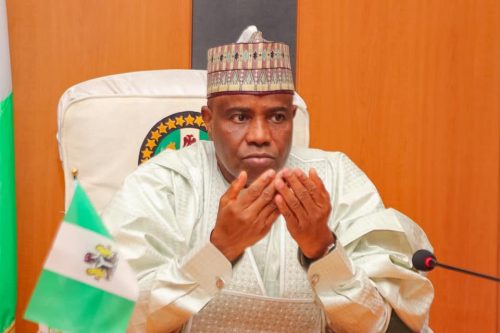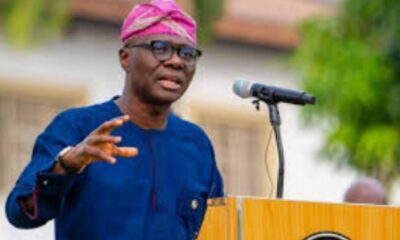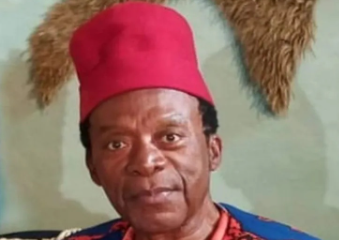BIG STORY
Tambuwal: Making Giant Strides In The Seat of The Caliphate
Published
2 years agoon

As he rounds off the third year of his second term in office in three months’ time, Governor Aminu Waziri Tambuwal of Sokoto State could as well begin to roll out the drums ahead of the May 29, 2022 date in celebration of his laudable achievements in the seat of the Caliphate. Since he was sworn in on May 29, 2019, for the second term, the ebullient and ever-smiling governor has left no one in doubt that he was committed to a broader policy direction for the next four years but also consolidating the gains recorded during his first tenure between 2015 and 2019.
Today, one of the poster boys of the Peoples Democratic Party, PDP, governors has made giant strides towards turning Sokoto into a remarkable state.
Tambuwal’s scorecard not just in three years but seven could be seen in all sectors, but more appropriately premised around three critical spheres: Education, Economy, and Infrastructure. And instructively, the remarkable improvements in all sectors since he took over as Governor of Sokoto State in 2015 are testaments to his careful policy choices and diligent implementation.
When he mounted the saddle in 2015, Tambuwal saw deplorable education indices across the state. He saw that the decay in the educational sector had almost engulfed the state. Thus, he was determined to arrest the ugly situation.
Barely six months after he assumed office he declared a State of Emergency on the Education sector in December 2015. Early in the following year, the Right to Education Bill 2016 was signed into law. The new law made education a justiciable right and made it illegal for children to be out of school by the actions of their parents.
For proper implementation of the new order, the fledgling administration embarked on massive school renovation and the building of special schools. These were promptly handed over to the Local Government Councils to manage while the State provided funds.
Tambuwal’s transformation in the education sector since 2015 is legendary in Sokoto State. A bird’s eye view:
· Between 2016 and 2019, two Junior Secondary Schools were built in each of the 23 Local Government Areas in the state while four Junior Secondary Schools were built in the State Capital.
· Renovation of 1500 Primary Schools and 180 Junior Secondary Schools are currently ongoing and have reached over 70% completion.
· The administration has consistently provided not below 26% of the yearly budget for education. This is above UNESCO’s benchmark of between 15% and 20% for education.
· Over 600,000 children have been enrolled in school since 2016 with a consistent rise in the number of children getting back to school. Most importantly Tambuwal’s government has focused on getting more girls into school, improving the lives and chances of women within the state.
· Between 2016 and 2017, there was a 4.4% increase in the enrolment of girls into primary schools.
· The administration created an Agency for Girl Child Education which focuses on getting more girls into school by engaging with their parents and communities on the importance of educating the girl child. Following a combination of community enlightenment and cash-backed incentives, there has been a massive increase in the enrolment of girls into schools across the state.
· The government achieved a remarkable increase in enrolment of girls into school with the government constructing more girls-only schools across the 23 local government areas.
· Government Science Senior Secondary School has been built in grand style across the three senatorial districts which would allow direct entry for girls who had finished from the junior secondary schools within the state.
· Barely a year after he took over, the number of girls enrolled at junior secondary schools within the state stood at 71,132 in 2016 compared to 22,021 in 2012.
· Enrolment into senior secondary had also increased from 22,755 in 2014 to 27,004 in 2017.
· Recognising that early marriage is a setback to girls’ school enrolment, in November 2021, 18 years after the passage of the Child Rights Act 2003, the Sokoto State Government joined the rest of Nigeria in domesticating the Child Rights Act. Tambuwal achieved this after nearly six years of painstaking engagement with stakeholders. This is considered a great feat in the most conservative part of Northern Nigeria, the seat of the Caliphate.
In the past six years, the Tambuwal Administration has frontally confronted the infrastructure deficit in his State. Before his emergence on the scene, Sokoto and Kebbi States had the lowest levels of access to potable water at 38 percent and 39 percent respectively. But Aminu Tambuwal is deftly tackling the problem.
In collaboration with the United States Agency for International Development, USAID, the administration has provided safe drinking water for over 30 formal and non-formal primary schools and learning centers in the state. About 700 towns and villages across the 23 local government areas now have potable water. This is in addition to the 1.5 million liters per day of water projects provided in all the headquarters of the 23 local government areas.
The health sector has received considerable attention as well. Last year, the government inaugurated launched, and completed the multi-billion Naira Sokoto State Advanced Medical Diagnostic Centre in Farufaru. The diagnostics center was set up to intervene in providing first-rate medical services in the state. It boasts cutting-edge medical equipment and technologies to rival some of the best across the world.
The previous year, in late 2020, work commenced on the 1,060-bed space Sokoto State University Teaching Hospital project. Work is ongoing at a very fast pace. The sum of N10 billion has been set aside by the state government for the hospital. Instructively, the Teaching Hospital will be the largest in West Africa. It is linked to three 150-bed capacity new premier hospitals situated in each of the senatorial districts in the state, which are in Binji, Sabon Birni, and Tambuwal, and would serve as an accessible referral for patients from the rural areas. Hitherto, the hospitals served the rural demographics at the mercy of primary health care centers or the distant urban hospitals.
Governor Tambuwal in partnership with the World Bank committed N8.8billion in 10 LGAs to address the perennial erosion, flood, and other complex environmental challenges in the state which have affected the existing infrastructure and livelihood of the people. The projects include rehabilitation of Lugu dam and Wurno irrigation scheme in Wurno LGA, control of river erosion along the bridge linking Sabon Birni and the Niger Republic, construction of medium earth dam at Rafin Duma and Kadassaka area in Gada LGA, and construction of main collector drainage and gutter from Tudun Wada area to River Sokoto in Sokoto South LGA. All the projects have been completed.
Other notable projects include the construction of drainage gutter at Goronyo Dam and construction of earth dam and afforestation activities to mitigate erosion menace in Ungushi District of Kebbe LGA.
Similarly, other projects are at advanced stages of completion. Among these is the construction of drainages, earth dams, and land reclamation across multiple locations in Tambuwal LGA; construction of drainages, earth dam, afforestation activities to control erosion of Durbawa in Kware LGA; construction of earth dam, drainage, and afforestation activities to check flood and erosion in Sifawa in Bodinga LGA as well as the construction of drainage gutters to alleviate flood in Wamakko LGA.
To improve transportation in the state, many critical economic roads have been completed and these have enhanced economic and social activities in the state. Among these are Bachure – Falu, 5.6km’ Tambuwal township roads; Tashar Iillela road; Gidan Igwai road; Sokoto Metropolis roads; Ugwamrogo road; Maituta road; Jemeta township roads; dualization of Sultan Ibrahim Dasuki road; Runjin Sambo roads.
Others include Agaiye, FGC-NNPC – Mabera Salame; Guiwa low cost; Jaiz Bank; Ubandoma; Tsafe; Katsina; Keystone Bank; Gidado; Bodinga; Justice Ladan Tsamiya, Sani Dingyadi; Barth and State Library roads.
It is worthy to note that gradually, Governor Aminu Tambuwal is changing the economic landscape of Sokoto State. The 2018- 2019 survey by the National Bureau of Statistics, NBS, placed Sokoto State as the poorest in Nigeria with 87.7% of its population within the poverty basket. With a population of about 5.3 million persons, this means that 4.6 million of its population is poor. Although many people in Sokoto doubt the veracity of this NBS report, given the sample size of 22,110 households used for the survey from a population of over 200 million of the Nigerian populace, the PDP administration is doing a lot to turn things around.
The current administration has increased internally generated revenue, IGR, by 238% between 2015 and 2020. “This continuous growth has been very significant. This is a positive mark on the Tambuwal administration,” a government official noted.
Although Sokoto’s debt stock has grown significantly, it still remains the second-lowest in the country. “This growth is justified by the significant increase in infrastructure development which the state government is currently undertaking. Having the second-lowest debt profile in the country, qualifies the state to be able to take on more loans to allow for further development,” the official said.
Fiscal transparency, accountability, and sustainability have been a cardinal focus of the Tambuwal Administration. In this respect, the World Bank granted Sokoto State Government $1.5million for its commitment to the implementation of the States’ Fiscal Transparency, Accountability, and Sustainability, SFTAS.
The state government clinched the grant after its astronomical score in the SFTAS ranking from 2/5 in 2019 to 14/15 in 2020, which puts it among the top three states in the country to achieve such.
Notably, Sokoto is one of the few states in Nigeria to have operationalized its Treasury Single Account, TSA, covering at least 60% of its finances
The Tambuwal Administration has taken the issue of Ease of Doing Business seriously. In the “States Ease of Doing Business Survey Results” by PEBEC in collaboration with KPMG Nigeria, Sokoto State scored 6.88. Between 2015 and 2018 the state has implemented reforms making it easier to enforce contracts. Within the period also, the state has fast-tracked commercial dispute resolution by introducing a frontloading procedure as part of its 2015 High Court rules
It is instructive to note that the Tambuwal administration despite the paucity of funds, ensures that workers and pensioners receive their salary and pensions as at when due.
Governor Tambuwal’s management of the Covid-19 crisis also marked him out as a leader to watch out for. Even with the meager resources available to the state, he increased the hazard allowances of health workers in the state by 100 percent. Also, he recalled all the retired health workers in the state: medical doctors, nurses, pharmacists, laboratory attendants, among others to help in the fight against the pandemic.
To take care of those recalled, Tambuwal directed the state Commissioner for health, Dr. Muhammed Ali Inname, to place all of them on their last salary before retirement.
To further contain the scourge, the state government launched a volunteer scheme against the spread of Covid-19. Sokoto remains the only state to do so. During the launching of the scheme at the International Conference Centre, Sokoto, Governor Tambuwal disclosed that the proposed allowances to be given to the volunteers would be doubled in appreciation of the workers’ solidarity and selfless service.
Such deft managerial acumen has ensured that Sokoto is one of the few states where health workers have never for once embarked on either warning or total strike, even for a day since the coming of Tambuwal.
It is therefore not surprising that Aminu Waziri Tambuwal’s outstanding strides in the development of Sokoto State have earned him accolades and awards from many quarters. Among these are the Tribune Platinum Torch Bearer, Silverbird Television Man of the Year, etc.
You may like
-


48-Yr-Old Nigerian Man Who Relocated To UK In 2022 Beats Wife To Death With Son’s Skateboard Over Bills, Alleged Infidelity
-


MTN, Glo, Other Telcos Seek NCC Approval For Tariff Hike Over Forex Instability
-


Avoid Panic Buying, We’re Not Changing Petrol Prices — NNPCL To Nigerians
-


Former Deputy Governor Agboola Ajayi Wins Ondo PDP Gubernatorial Primary
-


Former Senate Spokesperson Ayogu Eze Dies At 66
-


Lagos Workers Now Earn N70,000 As Minimum Wage Since January — Sanwo-Olu
BIG STORY
48-Yr-Old Nigerian Man Who Relocated To UK In 2022 Beats Wife To Death With Son’s Skateboard Over Bills, Alleged Infidelity
Published
31 mins agoon
April 26, 2024
Olubunmi Abodunde, a Nigerian living in the United Kingdom, killed his wife Taiwo by beating her with their son’s skateboard.
After arriving in the UK from Nigeria in 2022 with three children, the couple never got along and frequently argued over expenses and rumoured affairs.
According to Daily Mail, 48-year-old Abodunde, who has been the subject of multiple domestic abuse investigations by Suffolk Police, was scheduled to stand trial for murder on Wednesday but then entered a guilty plea after the jury was sworn in.
During the abuse, officers heard ‘a number of bangs’ inside the house, which Abodunde had gone into, despite bail conditions imposed the day before that banned him from the property following another violent episode.
When they finally entered 25 minutes later, they found the wife, 41-year-old Taiwo, with her ‘skull smashed in’.
However, Judge Martyn Levett, sitting at Ipswich Crown Court, warned him the only possible sentence was life imprisonment.
Suffolk Constabulary has referred itself to the Independent Office of Police Conduct, which confirmed three officers were under investigation.
An IOPC spokesman said, “We advised two Suffolk officers that they are under investigation for potential breaches of the police standards of professional behaviour at the level of gross misconduct.
“We advised another officer that they are under investigation at the level of misconduct.”
Abodunde had a history of jealousy and suspicion and accused his wife of having affairs. He had been investigated by police a number of times over alleged domestic violence incidents before his wife’s death.
He was arrested on April 27 last year when police arrived at the couple’s home in Newmarket, Suffolk, and found Mrs Abodunde with a split lip.
Later that day, he was freed on police bail with the condition that he stayed away from the marital home and didn’t approach his wife.
But after working a night shift at Tesco, he went home just after 9 am to allegedly pick up his mobile phone.
Two officers arrived at 9.20 am to take a statement from Mrs Abodunde about the previous night’s incident and heard repeated banging noises inside.
But it wasn’t until 9.55 am that they forced their way in after getting approval from senior officers and found Mrs Abodunde ‘obviously dead’ near the front door.
A post-mortem examination later showed she had been throttled until she fell unconscious, then stamped on until her ribs were broken before her husband used the skateboard to finish her off. The blows were so violent that the skateboard was damaged.
Prosecutor Simon Spence KC told the court the banging officers heard was likely to have been Abodunde continuing to attack his wife after she was unconscious or dead.
Mrs Abodunde had a job as a care home assistant in Cambridge, but her husband, who had trained as a civil engineer, was unable to find work in his profession and took shifts at Tesco and Wickes.
After his arrest for the murder, Abodunde was taken to hospital “because he appeared to have some sort of mental episode”.
He later claimed in a police statement he had acted in self-defence, saying, “My wife has subjected me to physical abuse for a number of years.
“On November 28, we got into an argument. She ran at me with a knife, I grabbed the knife and cut my hand. I was defending myself.”
But the court heard while he did have an injury to his hand, there wasn’t a knife near his wife’s body.
Nneka Akudolu KC, defending, said the level of violence was ‘completely out of character’ for her client and might have been affected by medication he was taking. But she said no medical evidence would be provided to support this claim.
Detective Inspector Dan Connick, of Suffolk Police, said after the hearing, “This was an awful attack on a woman that has had a lasting impact on the community and, most importantly, on the victim’s family.
‘We are pleased that Taiwo’s family will no longer have to go through the pain of a trial.
‘Our thoughts remain with Taiwo’s family and friends and hope this result will bring some small comfort to them.’
Taiwo Abodunde worked for Cambridge Manor Care Home, which provides dementia care and residential and respite care.
A spokesman for the facility, which is owned by TLC Care, said: ‘We are all deeply shaken and upset by the tragic death of Taiwo, who was a much-loved member of our home community.
‘Our thoughts and deepest condolences are with her family. Taiwo always cared for those we support with compassion and kindness, and she will be greatly missed by all of us and our residents.’
Abodunde was remanded in custody and will be sentenced on May 9.
BIG STORY
MTN, Glo, Other Telcos Seek NCC Approval For Tariff Hike Over Forex Instability
Published
1 hour agoon
April 26, 2024
Nigeria’s telecom providers, notably MTN Nigeria and Globacom, through the Nigerian Communications Commission (NCC), have requested permission from the Federal Government to increase their rates.
The move occurred after some of the operators had to report losses the previous year due to rising energy prices and foreign exchange losses.
Less than 24 hours had passed since MultiChoice, a pay television provider in South Africa, increased its pricing when the telecoms proposed to do the same. A number of businesses, such as breweries and discos, have also increased their pricing recently.
On Thursday, the telcos, under the aegis of the Association of Licensed Telecom Companies of Nigeria and the Association of Telecom Companies of Nigeria, issued a joint statement asking the government to expedite the approval.
The two bodies in their statement explained, “Despite the adverse economic headwinds, the telecommunications industry remains the only industry yet to review its general service pricing framework upward in the last 11 years, primarily due to regulatory constraints.
“For a fully liberalised and deregulated sector, the current price control mechanism, which is not aligned with economic realities, threatens the industry’s sustainability and can erode investors’ confidence.”
The associations called on the federal government to facilitate a constructive dialogue with industry stakeholders to address pricing challenges and establish a framework that balances consumers’ affordability with operators’ financial viability.
The telecom industry appears to be among a few sectors that have yet to review their prices despite the rising inflation in the country amid other economic challenges. They blamed this on the regulatory restraints that have been preventing them from pricing appropriately.
Efforts to reach the commission’s Director of Public Affairs, Reuben Mouka, on whether the request will be considered proved abortive as of press time on Thursday. There were no responses to calls, WhatsApp messages, and text messages sent to his line.
The NCC regulates prices in the telecom industry, and telecom operators are not allowed to implement any price changes without the regulator’s approval. The regulator has said a cost-based study is being conducted to determine if it would approve price increments for the operators.
The Chairman, Association of Licensed Telecoms Operators of Nigeria, Gbenga Adebayo, said in a publication on Thursday that cost reflective tariff was non-negotiable.
“We have seen the impact of price control in other segments of the economy, like power. If providers cannot operate sustainable business models, then they’ll stop investing. When that happens, the existing infrastructure starts to crumble.
“For power, a consumer can choose to take ownership of the solution by buying a generator, or a solar panel. For fuel, the government can step in as a provider of the last resort and manage a subsidy regime that mitigates the impact on the population. Those options are not available in the telecoms sector. There is no self-help solution,” he explained.
The industry has faced significant increases in operational costs occasioned by the scarcity of foreign exchange, network expansion, and upgrades, which have also negatively affected the bottom lines of the operators.
Investment in the sector has also dwindled to $134m in 2023 from $456.8m in the previous year, a decline of $322m, according to the National Bureau of Statistics.
The decline represented a decrease of approximately 70.5 percent.
MTN Nigeria Plc has disclosed a substantial loss of N740.4bn for the fiscal year 2023, a notable surge from the N81.8bn loss reported in 2022, marking an alarming 804 per cent increase, equivalent to N658.6bn.
This drastic financial setback is primarily attributed to the effects of the foreign exchange market liberalisation that commenced in June of the previous year.
MTN clarified that it applied an official exchange rate of N907.11 per dollar, based on NAFEM (Nigerian Autonomous Foreign Exchange Market), as of December 31, 2023.
This implies that the reported loss might escalate further if the prevailing exchange rate between the naira and dollar remains unchanged by the end of March, coinciding with the publication of its Q1 results.
Meanwhile, Airtel Africa reported a 99.6 per cent decline in its post-tax profit to $2m at the end of the nine months ended December 2023 from $523m at the end of the same period in 2022.
The key driver behind these losses was the liberalization of the forex market in June 2023, which led to a 96.7 per cent devaluation of the naira from N461 per dollar in December 2022 to N907.1 per dollar by the end of 2023, MTN disclosed in its audited financial results for 2023.
According to The Punch, the President of Telecommunications Companies of Nigeria, Tony Izuagbe, explained that telcos are running at a loss and may not survive this year should tariffs remain the same.
Izuagbe warned that if urgent action is not taken, many telecom operators may be forced to shut down operations, leaving millions of Nigerians without access to vital communication services.
He emphasised that the current tariff regime is insufficient to cover the costs of providing services, and urged regulatory bodies to address the industry’s challenges and support operators in maintaining the quality of service.
The current price of diesel, ranging from N1300 to N1500 per litre, has placed a substantial financial burden on operators, who consume an average of 2000 to 3000 litres per month per base station, Izuagbe analysed.
In 2023, telecommunication companies spent about N429.43bn on diesel for base stations, an increase of 34.57 per cent from the N319.11bn they spent in 2022. This is because diesel prices soared in 2022 and remained at an elevated level in 2023.
In 2022, the telecoms industry noted, “The telecommunications industry has been heavily financially impacted following Nigeria’s economic recession in 2020 and the effect of the ongoing Ukraine/Russia crisis. This has increased energy costs, (which constitutes an appreciable 35 per cent of ALTON’s members’ operating expenses).”
Telcos use an average of 40 million litres of diesel per month to power telecom sites.
ATCON President expounded, “We all know the challenges of inflation, which is affecting operators. Let’s take a typical diesel price, for example, which is sold at N1500 per litre or even N1300. On average, a typical base station would use about 2000–3000 litres in a month.”
Analysing further, he stated, “The cost per gigabyte of data in Nigeria is about N250. By the time you look at the expenses incurred in maintaining a base station, you will discover that revenue will not be enough to cover them.
“This excludes colocation and infrastructure services. By the time they mark up their charges, the operators will also be suffering.”
He revealed that many operators were already cutting back on infrastructure investments to mitigate losses and warned that if drastic measures are not taken, many may not survive the year.
Izuagbe acknowledged that the NCC has been working to address some of the challenges facing the industry, but emphasized that more needs to be done to ensure the survival of telecom operators.
He described the situation as a “chicken and egg scenario,” where it is difficult to improve the quality of service when operators are struggling to survive.
He urged the NCC to take further action to address the challenges facing the industry, including the issue of compensation for damaged infrastructure, to ensure that telecom operators can provide the quality of service that Nigerians deserve.
A commission official, speaking anonymously due to the sensitive nature of the issue, conveyed that the operators were left with no choice but to seek a tariff review approval from the commission. However, such approval might not be granted due to the prevailing high cost of living.
The official said, “Telecommunications cannot do anything without the commission’s permission. There can’t be any increment in cost without regulatory approval. That is what the law says. They can only keep agitating. The telecommunications sector is unlike other sectors that can increase their prices at any time without notice or recourse.”
Meanwhile, some subscribers and economists has shown support for the move by telecom operators to increase tariffs to stay afloat.
As of March 2024, industry statistics obtained from the NCC website showed that there are at least 219 million subscribers.
The President of the National Association of Telecommunications Subscribers, Adeolu Ogunbanjo, called for a marginal increase in tariff prices.
According to Ogunbanjo, the increase is necessary to help operators offset the rising cost of operations, including the purchase of equipment in dollars, which has been affected by the fluctuating exchange rate, and the removal of fuel subsidies, which has led to an increase in the price of diesel used to power base stations.
The NATCOM president acknowledged that telecom companies were facing significant challenges, including the need to improve services, deploy infrastructure, and power their base stations.
He noted that a slight increase in tariff prices would not be detrimental to subscribers but would rather help operators continue providing services and investing in infrastructure.
A slight increase in tariff prices would not be detrimental to subscribers but would rather help operators continue providing services and investing in infrastructure, Ogunbanjo pinpointed.
“A slight increase will not be bad so as not to suffocate the operators. They need to improve services, they need to deploy infrastructure, and it will be difficult if the situation doesn’t improve. They have to continue to power their base stations. Recently, they had issues with the undersea cable. All these issues have compounded their woes,” he buttressed.
Professor of Economics at Olabisi Onabanjo University, Sheriffdeen Tella, said that the move was long overdue.
The cost of operation for telecom operators has increased significantly, making it difficult for them to sustain their businesses, the academic stated.
“When I see the cost of sending text messages, I discover that they haven’t increased their charges. Generally, the cost of operation has increased, and it’s the government that is supposed to reduce the cost of energy, the interest rate, and all those indicators.
“So, since the government is not doing that, they cannot stop them. So there is a need for the government to review its policies. The need to intervene generally in the economy,” he elaborated.
Tella also highlighted the need for subscribers to adjust to the new reality and understand that operators cannot continue to operate at a loss.
He warned that if the situation is not addressed, more companies may be forced to leave the market, which would have negative consequences for the economy.
An economist, Aliyu Ilias, stated, “The move is justifiable, and the telcos and the NCC have been doing well. The way they have even approached the situation is commendable.
“The environment they operate in is not different from the environment others are operating in. It is a tight move, but the government needs to work with them to know the percentage they intend to increase the tariff,” Ilias argued.
Credit: The Punch
BIG STORY
Avoid Panic Buying, We’re Not Changing Petrol Prices — NNPCL To Nigerians
Published
12 hours agoon
April 25, 2024
The Nigerian National Petroleum Company (NNPC) Limited says there is no place to change the prices of petroleum products.
In a statement on Thursday by Femi Soneye, its spokesperson, the NNPC asked Nigerians to avoid panic buying.
The national oil firm said the limited availability of petrol in certain regions of the nation is a result of logistical problems.
However, the company said the challenge has been fixed.
“The Nigerian National Petroleum Company Limited (NNPC Ltd.) wishes to clarify that the tightness in the supply of Premium Motor Spirit currently being experienced in some areas across the country is as a result of logistics issues and that they have been resolved,” the statement reads.
“It also wishes to reiterate that the prices of petroleum products are not changing.
“It urges Nigerians to avoid panic buying as there is a sufficiency of products in the country.”
On March 24, the NNPC denied adjusting the pump price of petrol across its retail outlets.
This came after the organisation had promised Nigerians that there would not be any increase in the cost of petrol on February 9.
The NNPC also reaffirmed its commitment to sustaining the current sufficiency in the supply of petroleum products across all its retail stations in the country.

48-Yr-Old Nigerian Man Who Relocated To UK In 2022 Beats Wife To Death With Son’s Skateboard Over Bills, Alleged Infidelity

MTN, Glo, Other Telcos Seek NCC Approval For Tariff Hike Over Forex Instability

Avoid Panic Buying, We’re Not Changing Petrol Prices — NNPCL To Nigerians

Former Deputy Governor Agboola Ajayi Wins Ondo PDP Gubernatorial Primary

Former Senate Spokesperson Ayogu Eze Dies At 66

How I Survived Suicidal Thoughts, 14 Heartbreaks, 15 Abortions, Divorce And Alcoholism — Lara Kudayisi Don-Momoh [VIDEO]

BREAKING: EFCC Arrest, Detain Bobrisky

BREAKING: Bobrisky Sentenced To 6-Month Jail Term Without Option Of Fine Over Naira Abuse

Jnr. Pope: My Opinion On The Boat Crash That Claimed The Life Of Nollywood Talents By Seun Oloketuyi

Yahaya Bello: Lawyer Asks Kogi Assembly To Begin Impeachment Process Against Ododo
JoIn Us On Facebook
Most Popular
-

 ENTERTAINMENT4 days ago
ENTERTAINMENT4 days agoI Slept With A Female Producer To Land A Movie Role — Nollywood Actor Seun Jimoh
-

 BIG STORY2 days ago
BIG STORY2 days agoNollywood Losses Another Veteran Actor, Zulu Adigwe
-

 BIG STORY4 days ago
BIG STORY4 days agoFG Begins Loan Disbursement Process For MSME, Manufacturing Sector [See Criteria/How To Apply]
-

 BIG STORY19 hours ago
BIG STORY19 hours agoLagos Workers Now Earn N70,000 As Minimum Wage Since January — Sanwo-Olu
-

 BIG STORY2 days ago
BIG STORY2 days agoYahaya Bello Not Running From The Law, EFCC Lied, They Never Invited Him — Ex-Gov’s Media Office
-

 BIG STORY2 days ago
BIG STORY2 days agoJUST IN: EFCC To Arraign Former CBN Governor Emefiele On Fresh Charge, Says He Printed N684.5m Notes With N18.9bn
-

 BIG STORY4 days ago
BIG STORY4 days agoBREAKING: Soldiers Dismissed For Stealing Armoured Cables From Dangote Refinery
-

 BIG STORY3 days ago
BIG STORY3 days agoI’ll Resign If Yahaya Bello Is Not Prosecuted — EFCC Chairman Olukoyede














